动词ing形式做主语和宾语(课堂设计)
- 格式:doc
- 大小:158.25 KB
- 文档页数:6
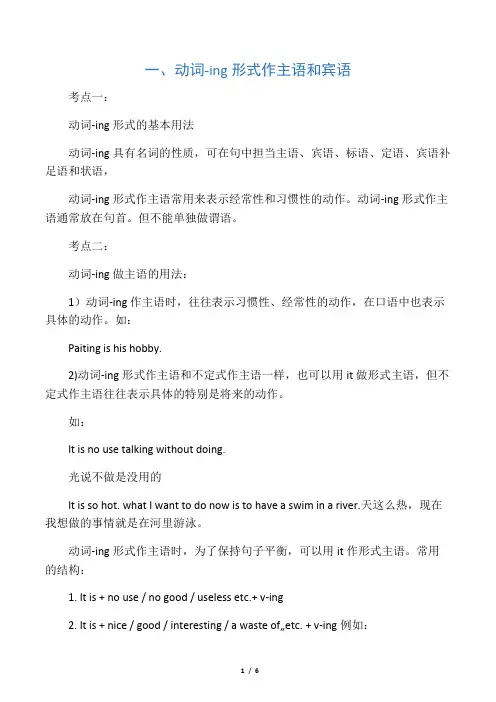
一、动词-ing形式作主语和宾语考点一:动词-ing形式的基本用法动词-ing具有名词的性质,可在句中担当主语、宾语、标语、定语、宾语补足语和状语,动词-ing形式作主语常用来表示经常性和习惯性的动作。
动词-ing形式作主语通常放在句首。
但不能单独做谓语。
考点二:动词-ing做主语的用法:1)动词-ing作主语时,往往表示习惯性、经常性的动作,在口语中也表示具体的动作。
如:Paiting is his hobby.2)动词-ing形式作主语和不定式作主语一样,也可以用it做形式主语,但不定式作主语往往表示具体的特别是将来的动作。
如:It is no use talking without doing.光说不做是没用的It is so hot. what I want to do now is to have a swim in a river.天这么热,现在我想做的事情就是在河里游泳。
动词-ing形式作主语时,为了保持句子平衡,可以用it作形式主语。
常用的结构:1. It is + no use / no good / useless etc.+ v-ing2. It is + nice / good / interesting / a waste of…etc. + v-ing例如:It is no use crying over spilt milk.事考点三:动词-ing形式作宾语的用法1.有些动词或动词短语常用动词-ing形式作宾语:admit,avoid,appreciate,consider,enjoy,escape,finish,keep,mind, miss, suggest等动词; can’t stand, give up, feel like, keepon, think of, set about, dream of等短语。
避免错过少延期建议完成多练习喜欢想象禁不住承认否定与嫉妒逃避冒险xxxx忍受保持不介意考虑欣赏还愿意2.在下列短语中,to是介词,后面应用动词-ing形式作宾语:be / get us ed to, look forward to, devote…to, pay attention to,object to等。

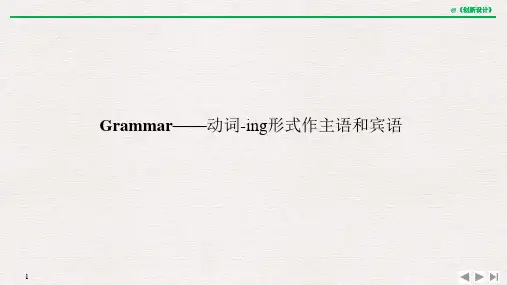

动词i n g形式做主语和宾语(课堂设计)The -ing form as the Subject and the Object教学设计Contents 教学内容Discovering useful structures(p.13); Using structures (p. 50)Teaching goals 教学目标1,Enable students to use the –ing form as subject and object correctly and freely.2.How to use the-ing form freely .Explaining , discussing and practicing .The importance and difficulties教学重点、难点1. Inspire Ss to discover the differenxes.2. Make Ss remenber the different predicate verbs.课前导学DiscoveringThe following sentences are from the text. There are some useful structures in them . Let students translate them and pay attention to these boldface words .1,he cares little about spending the money on himself or leadinga comfortable life . (The Object)2.He also doesn’t care about being famous. (The Object)3.His other hobbies include playing mah-jong ,swimming andreading .4.Wishing for things , however , costs noting .(The Object)5.Since then , finding ways to grow more rice has been his lifegoal .(The Subject)6.As a young man , he saw the great need for increasing the rice output . (The Object)7.Dr Yuan searched for a way to increase rice harvests without expanding the area of the fields .(The Object)8.Dr Yuan awoke from his dream with the hope of producing a kindof rice that could feed more people .(The Object)以学定教/展示激学 Teaching procedureStep 1 Warming upHave you ever seen these signs?What about these sentences?1. Saying is easy. Doing is difficult.2. Seeing is believing.3. Teaching is learning.4. Lying is a bad habit.5. Getting daily exercise is important.6. Learning English needs persistence.Step 2 As the SubjectPart 1 Pay attention to the following boldface words.plaining doesn't solve problems.2.Smoking causes a lot of health problems.3.To him, swimming is much fun.4.Talking mends no holes.5.Raising children is a big responsibility.6.Climbing the mountain in winter is dangerous.7.Asking a woman's age is impolite in my country.8.Riding with a drunken driver is a risk.9.Working hard will produce good results.10.Speaking in public is a challenge to a lot of people.Summary:The -ing form can be used as the subject.It can have its own object and adverbial. And the predicate verb is used singular form. Part 2 Pay attention to it(一)1) It is a waste of time doing this.→2) It is no use crying over spilt milk.→3) It is no use complaining.→4) It is no good worrying about it.→5) It is difficult finding your way around here?→Summary : It一是可以用It作形式主语;二是动词-ing形式可以有逻辑主语(即独立主格结构),三是可以有否定形式。
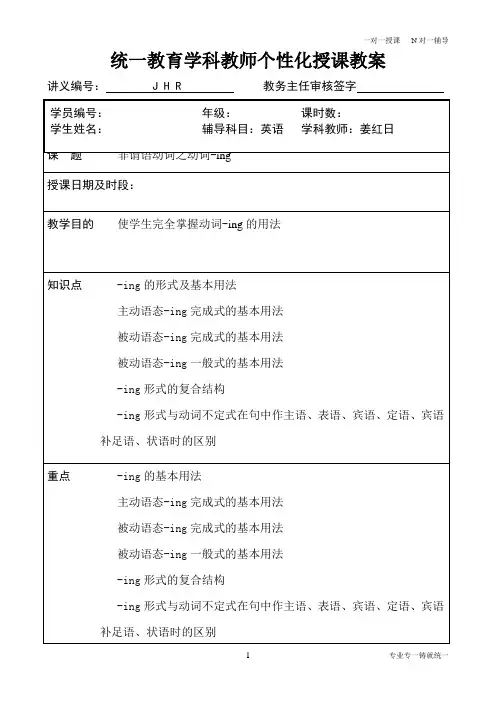
统一教育学科教师个性化授课教案讲义编号: J H R 教务主任审核签字27. Most of the artists ______ to the party 'were from South Africa.A. invitedB. to inviteC. being invitedD. had been invited28. English is a language ______ in many countries.A. spokenB. speakingC. be spokenD. to speak29. "Can you read?" Mary said to the notice.A. angrily, pointingB. and point angrilyC. angrily, pointedD. and angrilypointing30. There was a terrible noise _______ the sudden burst of Tight.A. followedB. followingC. to be followedD. being followed31. ____ more attention, the trees could have grown better.A. GivenB. To giveC. GivingD. Having given32. _____their students, the famous teacher came into the hall.A. FollowedB. Followed byC. Being followedD. Having been followed33. Your flat needs _____ . Would you like me it for you?A. to clean, to doB. cleaning, doingC. cleaning, to doD. to be cleaned, doing34. Does your new secretary ____ short hand?A. know to takeB. know how to takeC. know how takeD. know how taking35. Tommy had his big brother _____ his shoes for him.A. to tieB. tieC. tiedD. tying36. Would you please ______ write on the textbooks?A. don'tB. not toC. notD. to not37. I'd ______ the operation unless it is absolutely necessary.A. rather not haveB. rather not to haveC. not rather hadD. rather not having38. Your mother and I are looking forward________ you.A. of seeingB. for seeingC. to seeD. to seeing39. The girl couldn't_____ how red his face was.A. help to noticeB. be helping to noticeC. be helping noticingD. help noticing40. Excuse me, but it is time to have your temperature ______.A. takingB. to takeC. takeD. taken1~5 CDDAB6~10 BAACB11~15 BCADC16~20 BCCDB21~25 CDDAD 26~30 DAAAB 31~35 ABCBB 36~40 CADDD。
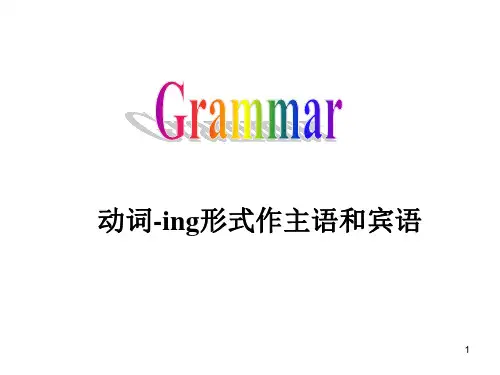
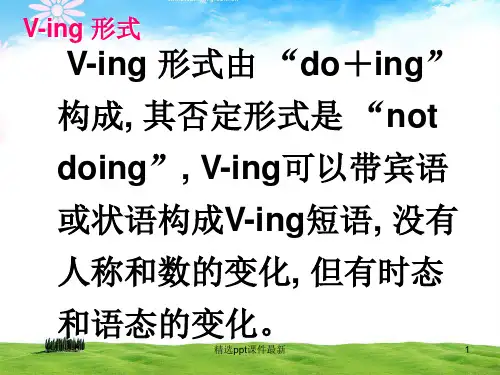
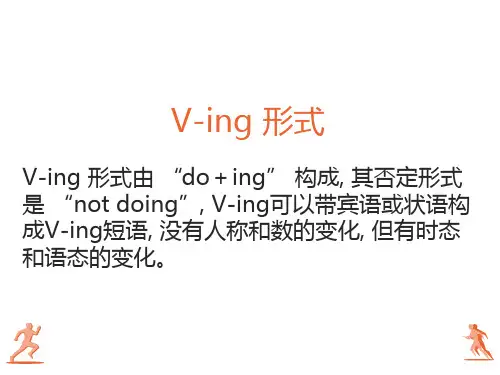
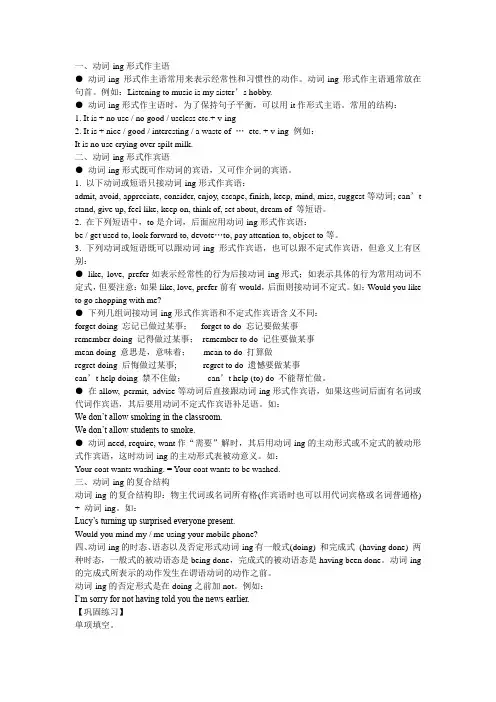
一、动词-ing形式作主语●动词-ing形式作主语常用来表示经常性和习惯性的动作。
动词-ing形式作主语通常放在句首。
例如:Listening to music is my sister’s hobby.●动词-ing形式作主语时,为了保持句子平衡,可以用it作形式主语。
常用的结构:1. It is + no use / no good / useless etc.+ v-ing2. It is + nice / good / interesting / a waste of …etc. + v-ing 例如:It is no use crying over spilt milk.二、动词-ing形式作宾语●动词-ing形式既可作动词的宾语,又可作介词的宾语。
1. 以下动词或短语只接动词-ing形式作宾语:admit, avoid, appreciate, consider, enjoy, escape, finish, keep, mind, miss, suggest等动词; can’t stand, give up, feel like, keep on, think of, set about, dream of 等短语。
2. 在下列短语中,to是介词,后面应用动词-ing形式作宾语:be / get used to, look forward to, devote…to, pay attention to, object to等。
3. 下列动词或短语既可以跟动词-ing形式作宾语,也可以跟不定式作宾语,但意义上有区别:●like, love, prefer如表示经常性的行为后接动词-ing形式;如表示具体的行为常用动词不定式,但要注意:如果like, love, prefer前有would,后面则接动词不定式。
如:Would you like to go shopping with me?●下列几组词接动词-ing形式作宾语和不定式作宾语含义不同:forget doing 忘记已做过某事;forget to do 忘记要做某事remember doing 记得做过某事;remember to do 记住要做某事mean doing 意思是,意味着;mean to do 打算做regret doing 后悔做过某事; regret to do 遗憾要做某事can’t help doing 禁不住做;can’t help (to) do 不能帮忙做。
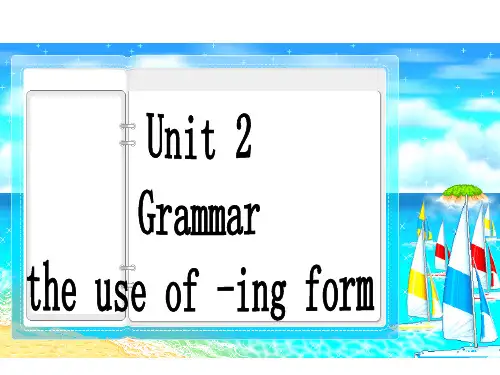
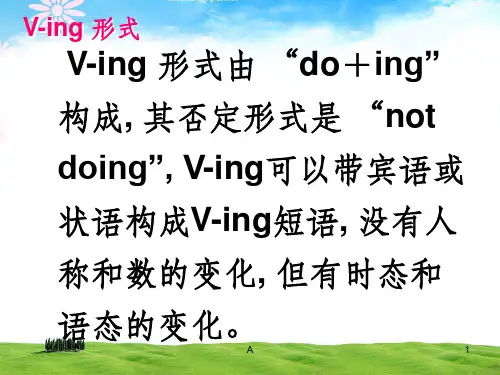
Part Ⅱ Grammar ——动词-ing 形式作主语和宾语[思维导图]一、概念动词-ing 形式是动词的一种非谓语形式,包括现在分词和动名词两种。
1.动词-ing 形式的时态和语态2.动词-ing 动名词在句中作主语、宾语、表语和定语;现在分词在句中作状语、宾语补足语和定语。
二、动词-ing 形式作主语1.动词-ing 形式直接作主语表示抽象的概念,通常直接置于句首,谓语动词用单数形式。
Reading aloud is a good way in learning a language.朗读是学习语言的一个好办法。
Getting up early is a good habit.早起是一种好习惯。
2.置于句末,用it 作形式主语,多见于下面几个句型:It is worth doing...做……是值得的It +be +a waste of time doing...做……是浪费时间的It is/was no good/use doing...做……是没有用的It is a waste of time talking about such useless things.谈论这些没用的事情是在浪费时间。
It is no use crying over spilt milk.覆水难收。
三、动词-ing 形式作宾语的用法1.有些动词和动词短语后常用动词-ing 形式作宾语。
如admit ,appreciate ,avoid ,stand(忍受),consider ,delay ,dislike ,enjoy ,imagine ,escape ,excuse ,suggest ,feel like ,finish ,forgive ,mention ,mind ,miss ,practise ,get down to ,give up ,devote...to ,insist on ,keep(on),look forward to ,pay attention to ,put off ,stick to ,be accustomed to =be used to(习惯于)等等。
动词ing形式做主语和宾语(课堂设计)The -ing form as the Subject and the Object教学设计Contents 教学内容Discovering useful structures(p.13); Using structures (p. 50) Teaching goals 教学目标1,Enable students to use the –ing form as subject and object correctly and freely.2.How to use the-ing form freely .Explaining , discussing andpracticing .The importance and difficulties教学重点、难点1. Inspire Ss to discover the differenxes.2. Make Ss remenber the different predicate verbs.课前导学DiscoveringThe following sentences are from the text. There are some usefulstructures in them . Let students translate them and pay attention to theseboldface words .1,he cares little about spending the money on himself or leading acomfortable life . (The Object)2.He also doesn’t care about being famous. (The Object)3.His other hobbies include playing mah-jong ,swimming and reading.4.Wishing for things , however , costs noting .(The Object)5.Since then ,finding ways to grow more rice has been his life goal .(The Subject)6.As a young man , he saw the great need for increasing the rice output .(The Object)7.Dr Yuan searched for a way to increase rice harvests withoutexpanding the area of the fields .(The Object)8.Dr Yuan awoke from his dream with the hope of producinga kind ofrice that could feed more people .(The Object)以学定教/展示激学 Teaching procedureStep 1 Warming upHave you ever seen these signs?What about these sentences?1. Saying is easy. Doing is difficult.2. Seeing is believing.3. Teaching is learning.4. Lying is a bad habit.5. Getting daily exercise is important.6. Learning English needs persistence.Step 2 As the SubjectPart 1 Pay attention to the following boldface words.plaining doesn't solve problems.2.Smoking causes a lot of health problems.3.To him, swimming is much fun.4.Talking mends no holes.5.Raising children is a big responsibility.6.Climbing the mountain in winter is dangerous.7.Asking a woman's age is impolite in my country.8.Riding with a drunken driver is a risk.9.Working hard will produce good results.10.Speaking in public is a challenge to a lot of people.Summary:The -ing form can be used as the subject.It can have its own object and adverbial. And the predicate verb is used singular form.Part 2 Pay attention to it(一)1) It is a waste of time doing this.→2) It is no use crying over spilt milk.→3) It is no use complaining.→4) It is no good worrying about it.→5) It is difficult finding your way around here?→Summary : It一是可以用It作形式主语;二是动词-ing形式可以有逻辑主语(即独立主格结构),三是可以有否定形式。
动词-ing 形式作主语和宾语一、动名词的形式主动形式被动形式一般式doing being done完成式having done having been done二、v-ing作主语的用法动名词作主语时,句子有三种形式:1. v-ing直接置于句首主语的位置上。
作主语表示抽象的或泛指的动作, 谓语动词用单数。
2. 动词-ing形式作主语时常后置, 用it作形式主语,用形容词或名词作表语。
常见的作表语的名词或短语有:useful, useless, no use, no good, fun, hard work, a hard / difficult job, a wonder, a waste of time等。
如:It is/was no good/use doing做…是没用的It is/was worth/w orthwhile doing 做…是值得的It is/was hardly/scarcely worth doing 做…不值得It is/was a waste of time doing 做…是浪费时间的3. “There is + no”后可以用动词-ing形式作主语,表示“没法……”,=“It is impossible to do… ”。
三、v-ing作宾语的用法1. 某些动词后只能用动名词作宾语,常见的此类动词有: admit, escape, appreciate, excuse, stand, advise, allow, permit, avoid, consider, enjoy, finish, imagine, include, keep, mind, risk, miss, delay(延误), practise, suggest等。
★★常跟动词ing作宾语的动词歌诀:考虑建议盼原谅,consider, suggest / advise, look forward to, excuse, pardon承认推迟没得想,admit, delay / put off, fancy避免错过继续练,avoid, miss, keep /keep on, practise否认完成停能赏,deny, finish, stop, enjoy / appreciate不禁介意准逃亡,can’t help, min d, allow/ permit, escape不准冒险凭想象。
The -ing form as the Subject and the Object教学设计Contents 教学内容Discovering useful structures(p.13); Using structures (p. 50)Teaching goals 教学目标1,Enable students to use the –ing form as subject and objectcorrectly and freely.2.How to use the-ing form freely .Explaining , discussing andpracticing .The importance and difficulties教学重点、难点1. Inspire Ss to discover the differenxes.2. Make Ss remenber the different predicate verbs.课前导学DiscoveringThe following sentences are from the text. There are some usefulstructures in them . Let students translate them and pay attention to theseboldface words .1,he cares little about spending the money on himself or leading acomfortable life . (The Object)2.He also doesn’t care about being famous. (The Object)3.His other hobbies include playing mah-jong ,swimming and reading.4.Wishing for things , however , costs noting .(The Object)5.Since then ,finding ways to grow more rice has been his life goal .(The Subject)6.As a young man , he saw the great need for increasing the rice output .(The Object)7.Dr Yuan searched for a way to increase rice harvests withoutexpanding the area of the fields .(The Object)8.Dr Yuan awoke from his dream with the hope of producing a kind ofrice that could feed more people .(The Object)以学定教/展示激学 Teaching procedureStep 1 Warming upHave you ever seen these signs?What about these sentences?1. Saying is easy. Doing is difficult.2. Seeing is believing.3. Teaching is learning.4. Lying is a bad habit.5. Getting daily exercise is important.6. Learning English needs persistence.Step 2 As the SubjectPart 1 Pay attention to the following boldface words.plaining doesn't solve problems.2.Smoking causes a lot of health problems.3.To him, swimming is much fun.4.Talking mends no holes.5.Raising children is a big responsibility.6.Climbing the mountain in winter is dangerous.7.Asking a woman's age is impolite in my country.8.Riding with a drunken driver is a risk.9.Working hard will produce good results.10.Speaking in public is a challenge to a lot of people.Summary:The -ing form can be used as the subject.It can have its own object and adverbial. And the predicate verb is used singular form.Part 2 Pay attention to it(一)1) It is a waste of time doing this.→2) It is no use crying over spilt milk.→3) It is no use complaining.→4) It is no good worrying about it.→5) It is difficult finding your way around here?→Summary : It一是可以用It作形式主语;二是动词-ing形式可以有逻辑主语(即独立主格结构),三是可以有否定形式。
(二)It is my duty helping her.→Helping her is my duty.It is a pleasure working with you .→Working with you is a pleasure. Transform the sentences in (一 ) (ommitted)ConsolidationA.1.Losing (lose) someone you love is a painful experience.2.Falling (fall) in love is easy. Staying(stay) in love is hard.3.Eating (eat) to live is more meaningful than living (live) to eat.4.Getting (get) married costs a lot. Getting (get) divorced costs much more.5.Spending (spend) money is easier than making (make) money.B.做课本练习2(p. 13)。
巩固动词-ing形式作主语的用法。
Step 3 As the ObjectPart 1 1. Read the the following sentences you found out from the text and try to find some rules.1) As a young man, he saw the great need for increasing the rice output.2) Dr Yuan searched for a way to increase rice harvests without expanding the area of the fields.3) He enjoys listening to violin music, playing mah-jong, swimming and reading.4) Dr Yuan awoke from his dream with the hope of producing a kind of rice that could feed more people.Summary:The -ing form can be used as the object both of verb and preposition.2. Look at the following sentences. What have you found?1) He suggested doing it in a different way.2) The president tried to avoid answering the reporter’s questions.3) I admit having read your letter.4)We’re considering paying a visit to the Science Museum.5)I have been used to living here.6) I’m fond of collecting stamps and coins.7) Mom agreed to lend me some money.8) Jack pretended not to see me when he passed.9) My friend offered to help when I was in trouble.Summary:1). Verbs with –ing form as their object:admit, advise, allow, appreciate, avoid, complete, consider, delay, deny, enjoy, escape, finish, imagine, keep, mind, miss, postpone, practise, quit, suggest, stop, can’t stand, can’t help, be worth2).Verbs with the infinitive as their object:afford, agree, arrange, choose, decide, hope, expect, offer, plan, promise, determine, demand, manage, fail, prepare, refuse, pretend, seem 常跟动词ing作宾语的动词歌诀:考虑建议盼原谅,consider, suggest / advise, look forward to, excuse, pardon承认推迟没得想,admit, delay / put off, fancy避免错过继续练,avoid, miss, keep /keep on, practise否认完成停能赏,deny, finish, stop, enjoy / appreciate不禁介意准逃亡,can’t help, mind, allow/ permit, escape不准冒险凭想象。